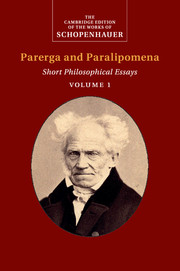Book contents
- Frontmatter
- Contents
- General Editor’s Preface
- Editorial Notes and References
- Introduction
- Notes on Text and Translation
- Chronology
- Bibliography
- Parerga and Paralipomena: Contents
- Preface
- Sketch of a History of the Doctrine of the Ideal and the Real
- Fragments for the History of Philosophy
- On University Philosophy
- Transcendent Speculation on the Apparent Deliberateness in the Fate of the Individual
- Essay on Spirit-Seeing and Related Issues
- Aphorisms on the Wisdom of Life
- Chapter I Fundamental Division
- Chapter II What One Is
- Chapter III What One Has
- Chapter IV What One Represents
- Chapter V Counsels and Maxims
- Chapter VI On the Different Stages of Life
- Versions of Schopenhauer’s Text
- Glossary of Names
- Index
On University Philosophy
Published online by Cambridge University Press: 30 June 2022
- Frontmatter
- Contents
- General Editor’s Preface
- Editorial Notes and References
- Introduction
- Notes on Text and Translation
- Chronology
- Bibliography
- Parerga and Paralipomena: Contents
- Preface
- Sketch of a History of the Doctrine of the Ideal and the Real
- Fragments for the History of Philosophy
- On University Philosophy
- Transcendent Speculation on the Apparent Deliberateness in the Fate of the Individual
- Essay on Spirit-Seeing and Related Issues
- Aphorisms on the Wisdom of Life
- Chapter I Fundamental Division
- Chapter II What One Is
- Chapter III What One Has
- Chapter IV What One Represents
- Chapter V Counsels and Maxims
- Chapter VI On the Different Stages of Life
- Versions of Schopenhauer’s Text
- Glossary of Names
- Index
Summary
Ήἀτιμία ϕιƛoσoϕίᾳ διὰ ταῦτα πρoσπέπτωϰϵν,
ὅτι oὐ ϰατ̕ ἀζίαν αὐτῆς ἅπτoνται: oὖ γὰρ
νóϑoυς ἔδϵι ἅπτϵσϑαι, ἀƛƛὰ γνησίoυς.
[Philosophy has fallen into disgrace, becausepeople do not engage in it in accordance with itsown worth; not spurious, but genuine philosophersshould undertake it.] Plato, Republic VII [535c]
That philosophy is taught at universities certainlybenefits it in many respects. In this way it obtainsofficial existence and its standard is plantedbefore the eyes of people, so that its presence isalways freshly brought to mind and attractsattention. However, the main benefit might be thatmany a young and capable mind will be introduced toand inspired to study philosophy. Meanwhile it mustbe admitted that whoever has a talent for it andthus is in need of it, might very well encounter andget to know it in other ways. For things that loveand are born for one another converge easily;kindred souls greet each other already from afar.Any book of a genuine philosopher that falls intothe hands of such people will excite them morestrongly and more effectively than is possiblethrough the lecture of an academic philosopher ofthe garden-variety. In addition, Plato should bediligently read in the high schools, for he is themost effective stimulant for the philosophical mind.But in general I have gradually formed the opinionthat the benefit of academic philosophy justmentioned is outweighed by the disadvantage thatphilosophy as a profession produces for philosophyas the free search for truth, and that philosophy bygovernment order imposes on philosophy practised onbehalf of nature and humanity.
First of all, a government will not pay people tocontradict directly, or even just indirectly, whatit has proclaimed from all the pulpits by a 150thousand priests, or teachers of religion, in itsemploy, since this, to the degree that it wereeffective, would have to render the formerarrangement ineffective. For it is well-known thatjudgements cancel each other not only throughcontradictory, but also through merely contraryopposition; for example, the judgement ‘The rose isred’ is not only gainsaid by ‘It is not red’, butalso by ‘It is yellow’, which achieves as much or,indeed, more. Hence the principle: ‘We will rejectwhoever teaches otherwise.’
- Type
- Chapter
- Information
- Schopenhauer: Parerga and ParalipomenaShort Philosophical Essays, pp. 125 - 176Publisher: Cambridge University PressPrint publication year: 2014

